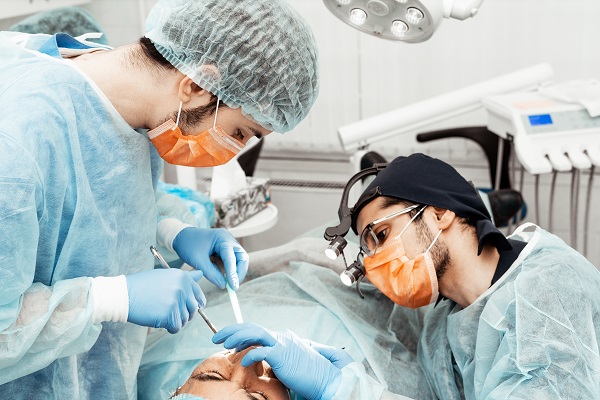When Would a Chin Graft be Recommended?

At times, a chin graft is needed to support a corrective dental or cosmetic procedure. Some consider this procedure a form of gum surgery, as it involves manipulating the gums in order to treat conditions of bone loss that may have occurred from injury, tooth extraction, or gum disease. In a bone graft, a dental surgeon removes a portion of natural bone from the chin and grafts it into an area of the mouth needing bone restoration.
Who needs a chin graft?
Many dental patients may need a bone graft, as a leading aim of this procedure is to restore form and function to a mouth that has experienced insufficient growth in the jawbone. The process has a high success rate and is often recommended in the following situations.
Gum problems
For those who do not consistently floss, the gums can develop a disease called periodontitis. When the condition becomes severe, it can weaken the jaw, and the teeth can become loose and unstable. As the disease progresses, bone loss is likely to occur. A graft can support the growth of new bone in the jaw and return stability to the teeth and overall structure of the mouth.
Dental implants
Implants are used to help fill in gaps left by missing teeth and provide a long-term foundation for the replacement tooth. Implants are titanium screws that are placed into the jawbone to act as tooth roots. These artificial tooth anchors require a stronghold, and if there is not enough jawbone present, a graft may be the solution to creating enough support. Implants are an important part of strengthening the jawbone, and the repetitive pressure and motion of chewing can help prevent further loss once the bone grows in.
Misaligned teeth
Malocclusion is the term for a bad bite or a condition where the upper jaw teeth are not properly aligned with the teeth in the lower jaw. Though misalignment with the teeth can be treated with orthodontic solutions such as braces, malocclusion can come directly from misalignment with the jaws. This condition can cause speech problems, create difficulty with chewing foods, and create changes in the facial profile. Before proceeding with treatment to address misalignment, a graft may be needed to strengthen the jawbone to support the changes that will occur.
What graft options are available?
There are several types of bone grafts commonly used in oral treatment. An oral surgeon will perform a graft depending on the condition of the mouth and the purpose of the treatment. Socket preservation is a graft that supports the structure of a socket left behind after extraction. A ridge augmentation helps increase the volume or width of the jawbone for restorative services. A periodontal graft will place support material around a tooth to provide support and reduce movement when gum disease has created stability concerns.
Conclusion
A chin graft may be recommended when the restorative oral health treatment requires extra bone support. A strong jawbone is necessary to support implants, braces, dentures, and more. Consult with a dental surgeon to find out which graft is needed.
Contact an oral surgeon to find out more about the special services that can help restore your oral health and improve your appearance. Schedule your appointment today.
Check out what others are saying about our services on Yelp: Read our Yelp reviews.
Recent Posts
The jawbone is the part of the face that holds many essential elements together, such as the teeth, ligaments, and muscles; however, bone grafting may sometimes be necessary if the jawbone is too weak to perform these tasks. A person’s jawbone can deteriorate over time, whether due to age, genetics, poor oral health, cancer, or…
Finding lasting relief from issues such as misalignment and facial asymmetry can involve specialized procedures. Fortunately, corrective jaw surgery is a reliable option for addressing these concerns. A dental specialist realigns the upper or lower jaw during this process to promote better function and comfort. Although the procedure can benefit health and appearance significantly, a…
Many individuals seek rhinoplasty to enhance facial harmony, improve nasal function, or correct structural abnormalities. As a surgical procedure that reshapes the nose, rhinoplasty can address aesthetic concerns as well as breathing difficulties caused by structural defects such as a deviated septum. Understanding the consultation process, surgical techniques, and what to expect from the recovery…
The facelift is one of the oldest and most well-known cosmetic surgeries for restoring a youthful appearance to the face. If you are considering this procedure, it is important to understand the steps of the process and the time commitment involved. The specifics of the process can vary depending on the patient; however, here is…


